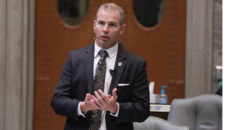For many of Missouri’s seniors who want to recover or receive care at home, Medicare’s home health benefit is a blessing. After a serious hospitalization, the majority of patients want nothing more than high-quality care in the comfort of their own home, with friends and family close by.
For decades, home health has been one of the most cost-effective, popular, and compassionate components of Medicare. When their physician determines it is medically appropriate, home health permits patients to recover at home under the supervision of home health care professionals, with the added benefit of saving taxpayer dollars.
But if the federal government pushes forward with its proposal to levy significant cuts to the Medicare home health program, seniors and patients with disabilities may no longer have this option. Signs of hospitals being unable to discharge patients into home health care settings in a timely manner are already appearing.
A nine (9) percent cut to Medicare’s home health benefit was recently proposed by the Department of Health and Human Services’ Centers for Medicare & Medicaid Services (CMS), and if this cut is finalized, access to home health will be in serious jeopardy. Unless the Administration reverses course, or Congress steps in to protect this vital benefit, it will become increasingly difficult for patients to receive care at home. Instead, they will be forced to remain in hospitals or enter institutional care settings.
Here in Missouri, the alarm bells are already ringing. Since 2019, dozens of home health agencies in our state have closed their doors. That means fewer local community based nurses and home health professionals and more families left with no nearby provider at all. In that time, over 26,000 Missouri seniors and patients with disabilities have lost access to home health care that they should have had.
National data shows that more than one-third of patients referred for home health after a hospital stay never receive it. Even for patients who are able to access home health services, the wait is growing longer. In fact, the average wait time is now a full day longer than it was just five(5) years ago. In rural areas, where workforce shortages are most acute, these delays often mean the difference between recovering safely at home or a chaotic and stressful return to the hospital. Now imagine what will happen if home healthcare is gutted by nearly 10 percent, when this access problem is already here on our doorstep?
Not only do patients prefer to receive care at home, but it is often the lower-cost, higher-quality alternative. Home healthcare costs eight to 12 times less per episode than nursing home or rehabilitative setting care. Delivered promptly, home health saves Medicare a significant amount of money by preventing avoidable hospital readmissions and institutional care.
It is no wonder Americans overwhelmingly oppose cuts to the home health care program. Polling conducted by President Trump’s chief pollster shows that 70 percent of voters are against CMS’s proposed plan. Research shows that this cut greatly strains our Medicare program and hits the taxpayer’s wallet: when patients are referred but do not receive home health care, hospital readmissions are 35 percent higher, ER visits are 16 percent higher, mortality rates rise by 43 percent, and costs of care go up by more than 5 percent.
Americans know home health works. But if these massive cuts are made, the damage will deepen. CMS’s own actuary projects that by 2027, nearly half of all home health agencies nationwide will be operating at a loss. For our state’s smaller, often family-run providers, this would likely be a breaking point. If they close, patients will not just have fewer choices—they may have no at-home care options at all.
Time is running out. If the federal government proceeds with their proposed rule, the cuts will take effect on January 1st.
Policymakers must instead act to halt these cuts—either administratively or by passing the bipartisan Home Health Stabilization Act of 2025. A pause would allow policymakers more time to reevaluate flaws in the current payment system and develop strategic reforms that target abuse and fraud to save dollars while still protecting access to care for our seniors. Missouri’s seniors should not have to pay the price for Washington’s mistakes.
Our elected officials in DC often speak about strengthening healthcare in rural America. Now is the time to step up to protect the care setting that seniors prefer and that families trust.

Former Speaker of the Missouri House of Representatives & currently the co-host of The Tim Jones & Chris Arps show on NewsTalkSTL









